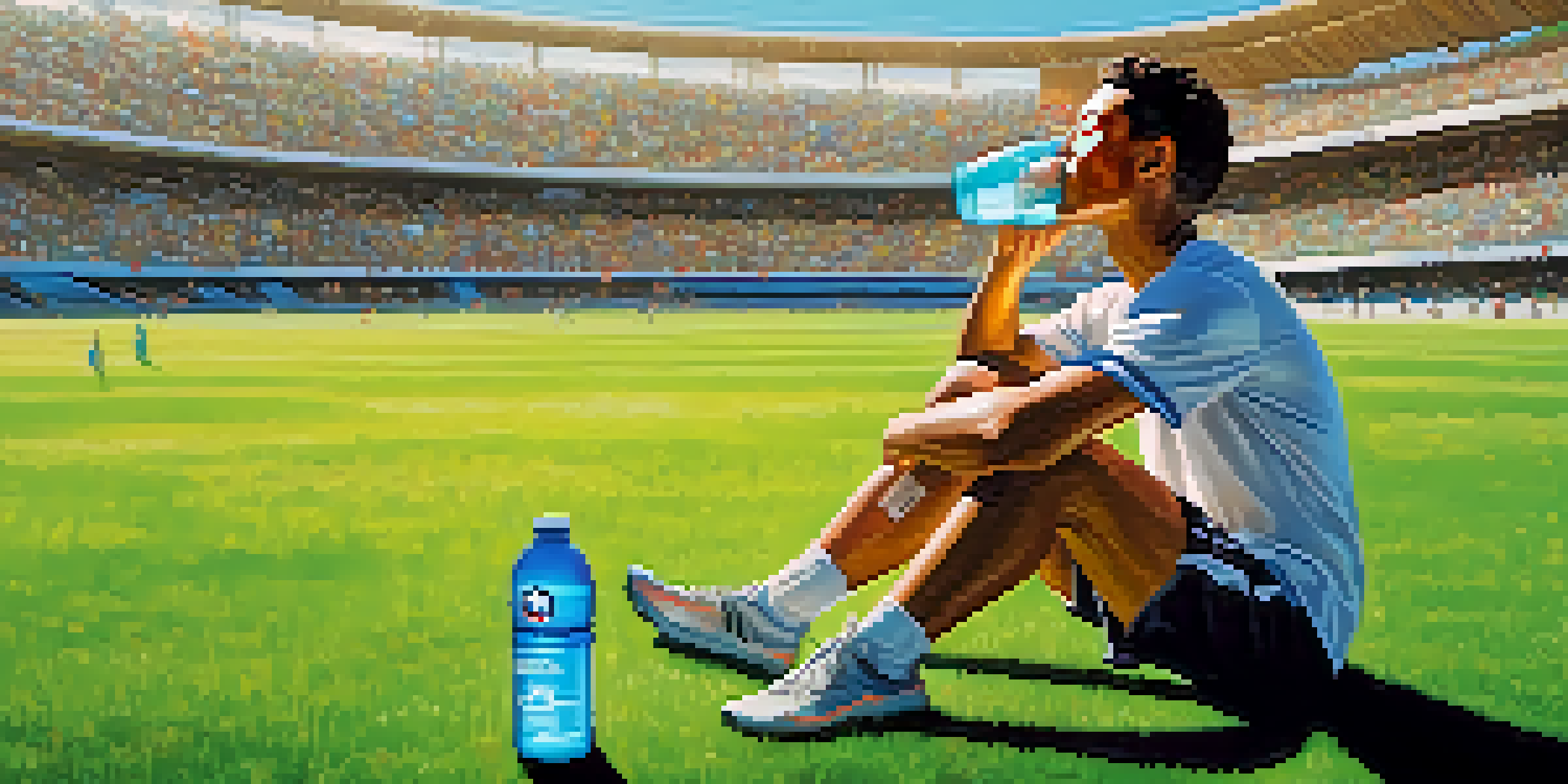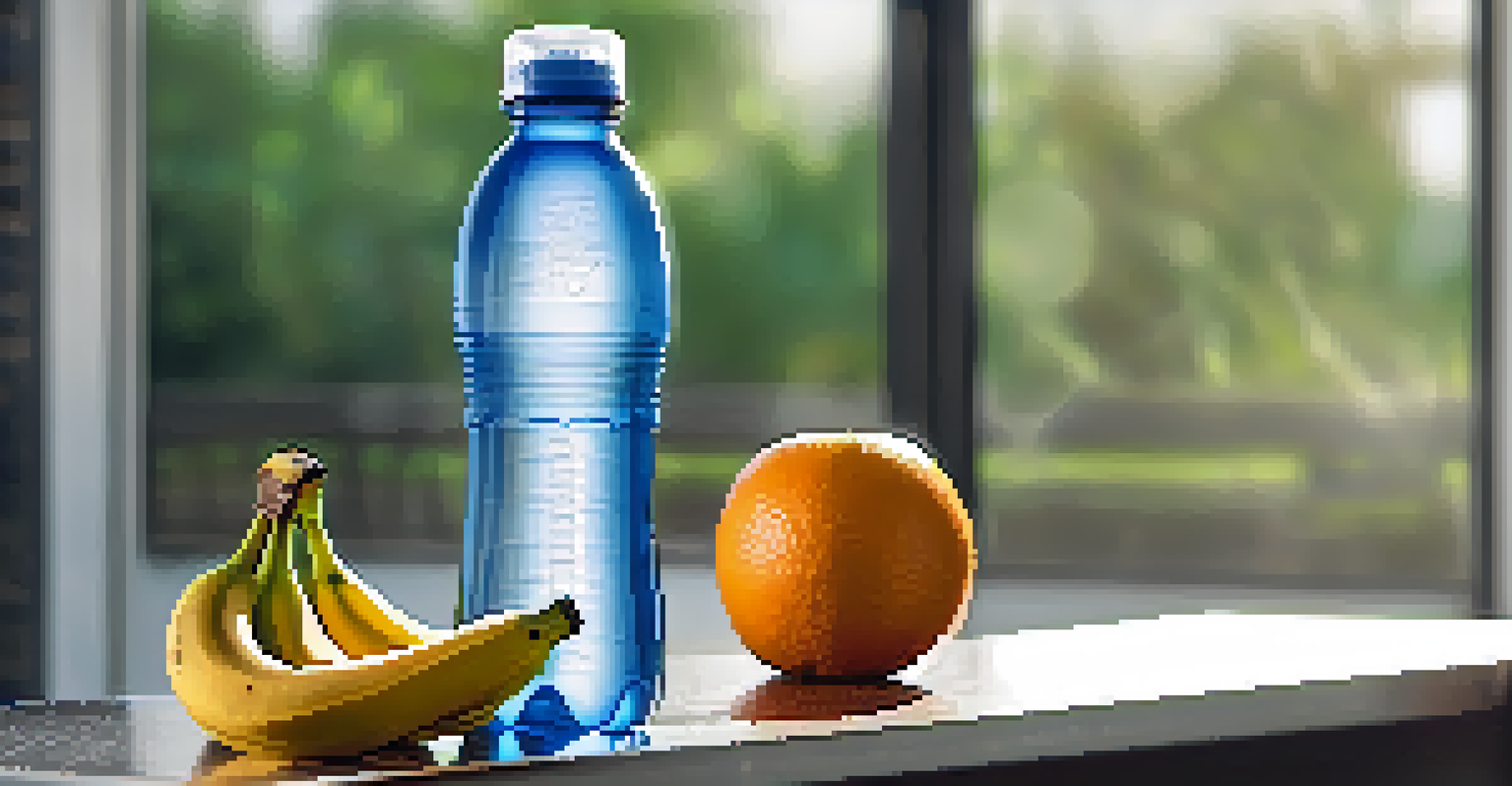The Importance of Hydration in Naturopathic Sports Care

Hydration: The Foundation of Athletic Performance
Hydration forms the cornerstone of athletic performance. When athletes are well-hydrated, their bodies can function optimally, allowing for improved endurance and strength. Conversely, even mild dehydration can lead to fatigue, decreased concentration, and impaired muscle function.
Water is the driving force of all nature.
Many athletes underestimate how much they sweat during workouts. For instance, a runner can lose several liters of fluid in just one session, making it crucial to replenish those lost fluids. This is where understanding hydration becomes vital in naturopathic sports care.
Incorporating proper hydration strategies can significantly influence an athlete's training results. By ensuring adequate fluid intake before, during, and after exercise, athletes can maximize their performance and minimize the risk of injury.
Understanding the Signs of Dehydration
Recognizing the signs of dehydration is essential for athletes. Common symptoms include thirst, dry mouth, fatigue, and dizziness. In more severe cases, dehydration can lead to headaches, rapid heartbeat, and muscle cramps, which can derail an athlete's performance.

Naturopathic sports care emphasizes the importance of listening to your body. Athletes should be mindful of how they feel during and after exercise, as these sensations can indicate hydration levels. For example, if you find yourself feeling unusually tired or sluggish, it might be time to reach for a water bottle.
Hydration Boosts Athletic Performance
Proper hydration enhances endurance, strength, and overall athletic performance by preventing fatigue and muscle dysfunction.
Additionally, monitoring urine color can be a practical way to assess hydration. Light yellow urine often indicates good hydration, while darker hues may signal a need for more fluids. This simple check can help athletes stay on top of their hydration needs.
Hydration's Impact on Recovery Post-Exercise
Post-exercise hydration is just as crucial as hydration during workouts. After intense physical activity, the body needs to replenish lost fluids to aid in recovery. This helps reduce muscle soreness and accelerates the healing process.
The body is made up of about 60% water, and it is crucial for maintaining health and performance.
In naturopathic sports care, a holistic approach to recovery includes not only hydration but also nutrition. Consuming electrolyte-rich fluids after exercise can restore balance and facilitate recovery. For instance, coconut water or electrolyte drinks can be excellent options.
Moreover, adequate hydration post-exercise supports overall health and wellness, reinforcing the body's immune system. By prioritizing hydration after workouts, athletes can enhance their recovery and prepare for their next training session.
Electrolytes: The Unsung Heroes of Hydration
Electrolytes, such as sodium, potassium, and magnesium, play a vital role in hydration, especially for athletes. These minerals help regulate fluid balance in the body and are critical for muscle function. When athletes sweat, they lose not just water but also these essential electrolytes.
Incorporating electrolyte-rich foods and drinks into a hydration plan can enhance performance. Foods like bananas, leafy greens, and sports drinks can replenish lost electrolytes, supporting optimal function. For instance, a pre-workout snack of a banana can provide the necessary potassium to prevent muscle cramps.
Signs of Dehydration Matter
Recognizing signs of dehydration, such as fatigue and dry mouth, is crucial for athletes to maintain optimal performance levels.
Understanding the relationship between hydration and electrolytes allows athletes to make informed choices. By balancing water intake with electrolytes, athletes can maintain peak performance and overall health.
Hydration Strategies for Different Sports Activities
Different sports require different hydration strategies. Endurance athletes, like marathon runners, may need to focus on larger fluid intake over extended periods, while team sports like soccer require quick hydration breaks. Tailoring hydration approaches to specific activities can help optimize performance.
In high-intensity sports, quick sips of water or electrolyte drinks during breaks can maintain hydration levels. On the other hand, athletes involved in longer sessions should consider hydration schedules, drinking consistently throughout the activity rather than waiting until they feel thirsty.
It's also essential to factor in environmental conditions. Hot or humid weather increases fluid loss, making it crucial for athletes to adjust their hydration strategies accordingly. By planning ahead, athletes can ensure they stay hydrated, regardless of the sport.
Creating a Personalized Hydration Plan
A personalized hydration plan is essential for every athlete. This plan should consider individual sweat rates, training intensity, and duration. By understanding personal hydration needs, athletes can make informed decisions about fluid intake.
Athletes can start by tracking their weight before and after workouts to gauge fluid loss. A simple rule is to drink about 16-20 ounces of water for every pound lost during exercise. This data helps in crafting a plan that meets specific hydration requirements.
Personalized Hydration Plans Are Key
Creating a personalized hydration plan based on individual sweat rates and training intensity helps athletes optimize fluid intake.
Additionally, consulting with a naturopathic sports care professional can provide tailored advice. They can help athletes develop a comprehensive hydration strategy that aligns with their training goals and overall wellness.
The Role of Hydration in Injury Prevention
Proper hydration is a key factor in injury prevention. Dehydrated muscles are more prone to cramps, strains, and injuries, which can sideline athletes for extended periods. Staying hydrated helps maintain muscle elasticity and joint lubrication, reducing the risk of injury.
In the context of naturopathic sports care, hydration is viewed as preventive medicine. By prioritizing hydration, athletes can not only enhance performance but also create a sustainable training routine free from setbacks caused by injuries.

Furthermore, being well-hydrated supports proper circulation, ensuring that nutrients reach muscles effectively. This holistic approach underscores how crucial hydration is, not just for performance, but also for long-term health and injury prevention.